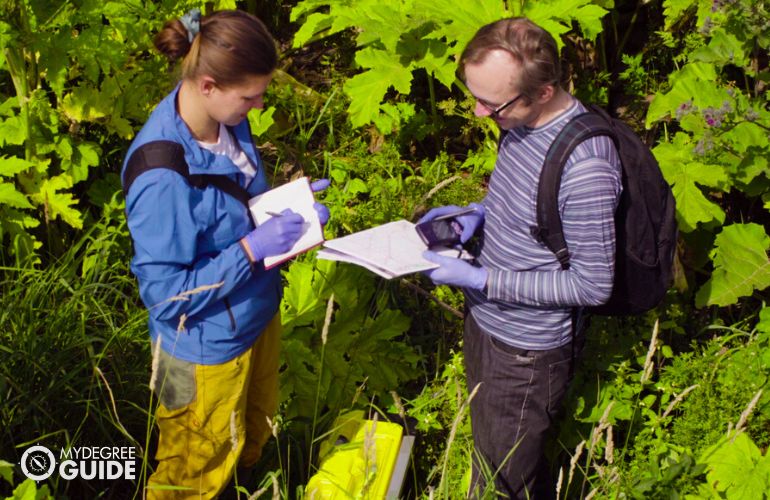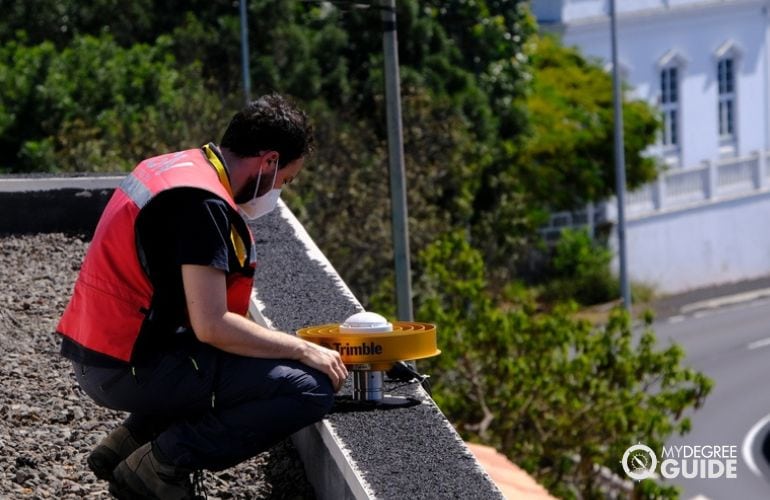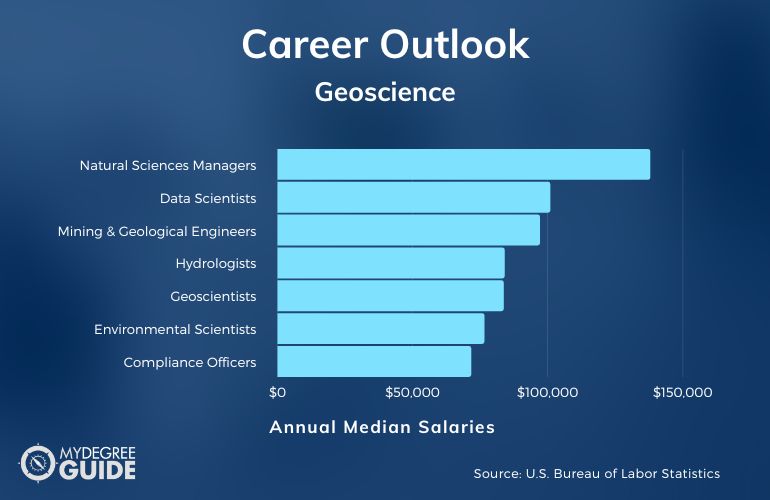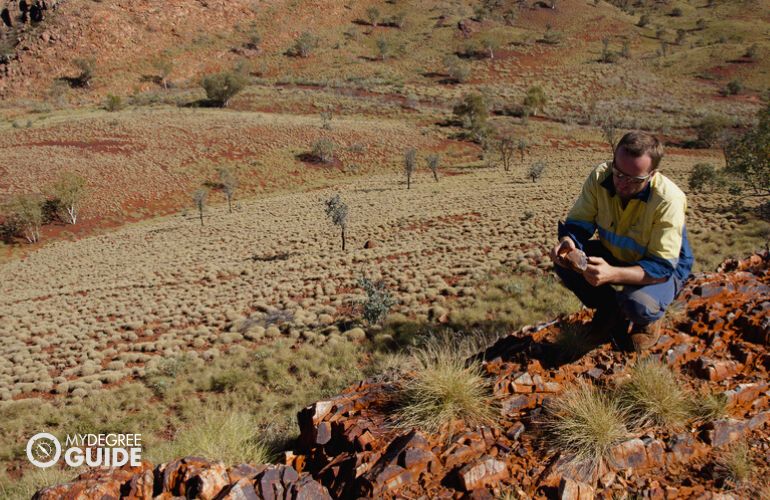Geology is the study of the earth and its various surfaces, and you may wish to pursue a geoscience degree if you’re interested in a holistic view of our planet.

Much like with earning an online bachelors in geography, earning a geoscience bachelor degree online is a strategic step for those who wish to become involved in utilizing and sustaining our planet’s many resources and maintaining environmental health.
Editorial Listing ShortCode:
Read on to discover more about a bachelor’s degree in geosciences and how you can start your studies in this exciting field.
Universities Offering Online Bachelors in Geosciences Degree Program
Methodology: The following school list is in alphabetical order. To be included, a college or university must be regionally accredited and offer degree programs online or in a hybrid format.
Arizona State University
Arizona State University offers an online program for a Bachelor of Science in Geography. The program requires the completion of 40 classes, and each class is 7.5 weeks long. Courses include Geographic Information Science I, Introduction to Physical Geography Lab, Introduction to Human Geography, and more.
Arizona State University is accredited by the Higher Learning Commission of the North Central Association of Colleges and Schools.
Florida Atlantic University
Florida Atlantic University offers a BA in Geosciences with a focus in Geography that can be earned online. Scheduling is flexible, and students are given access to tutoring and career services. Graduates often pursue careers in climate change research, petroleum and natural gas industries, government, and more.
FAU is accredited by the Southern Association of Colleges and Schools Commission on Colleges.
Fort Hays State University
At Fort Hays State University, students may pursue a BA in Environmental Geosciences or a BS in Geosciences with an emphasis in Geography, Geology, or Applied Geology. All but the BS with an emphasis in Geology can be completed online. Students may also simultaneously earn professional certificates as part of the program.
FHSU is accredited by the Higher Learning Commission.
Liberty University
Liberty University offers a BS in Geography that can be earned 100% online. Each course is 8 weeks long, and on average, students can graduate from the program in 3.5 years. Coursework includes Political Geography, Geographic Information Systems I and II, Geographic Research Methods, and more.
Liberty University is accredited by the Southern Association of Colleges and Schools Commission on Colleges.
Marshall University
Marshall University offers both a BA and a BS in Geography that can be earned 100% online. The degree programs are flexible and geared toward adults who work full-time. Classes are taught by faculty with extensive research experience. Marshall has a generous transfer credit policy for students who have already completed some college coursework.
Marshall University is accredited by the Higher Learning Commission.
Mississippi State University
Mississippi State University offers a Bachelor of Science in Geosciences with a concentration in Broadcast and Operational Meteorology that can be earned online. Courses follow a semesterly calendar, and all new students must begin in the fall. Coursework includes Introduction to World Geography, Physical Geography, Weather and Climate, and more.
Mississippi State University is accredited by the Southern Association of Colleges and Schools Commission on Colleges.
North Carolina Central University
North Carolina Central University offers a BS in Environmental and Geographic Sciences with a concentration in Geoscience. All courses are available on campus or in an online synchronous format. The program includes field experience options and helps to prepare students for careers in transportation analysis, hydrology, environmental project management, and more.
North Carolina Central University is accredited by the Commission on Colleges of the Southern Association of Colleges and Schools.
Old Dominion University
Old Dominion University offers both a BA and a BS in Geography. Students with previously earned, qualifying college credits may complete either program fully online. Students may pursue a concentration in Geographic Information Systems, Environment and Resources, or Urban Planning and Emergency and Hazards Management.
Old Dominion University is accredited by the Southern Association of Colleges and Schools Commission on Colleges.
Oregon State University
Oregon State University offers an online program for a BS in Geography and Geospatial Science. Oregon State uses a quarterly calendar, and there are four start dates every year. The curriculum emphasizes experiential learning and covers topics such as physical geography, climate justice, geographic field research, and more.
Oregon State University is accredited by the Northwest Commission on Colleges and Universities.
Southern New Hampshire University
Southern New Hampshire University offers an online program for a Bachelor of Science in Geoscience. Graduates of the program often work as geologists, environmental inspectors, compliance managers, and more.
Students in the program work on real-world projects, complete hands-on labs at home, and have internship opportunities. They can choose a concentration in either Data Analytics in Science or Natural Resources and Conservation.
Southern New Hampshire University is accredited by the New England Commission of Higher Education.
University of Alaska – Anchorage
The University of Alaska—Anchorage offers an on-campus BS program in Geological Sciences that is located in one of the best cities in the nation for careers in geology. The school also has student clubs and activities for geology majors. Some courses are available online to provide students with flexibility.
UAA is accredited by the Northwest Commission on Colleges and Universities.
University of Florida
The University of Florida offers a Bachelor of Arts in Geography: Environmental Geosciences. This online program provides a rigorous education but also flexibility for adult learners. Course options include Foundations of Geographic Information Systems, Earth Materials, Climatology, River Forms and Processes, and more.
The University of Florida is accredited by the Southern Association of Colleges and Schools Commission on Colleges.
University of North Dakota
The University of North Dakota offers a Bachelor of Science in Earth Science that can be earned online or on campus. The degree can usually be completed in 4 to 5 years of study and includes courses such as The Earth Through Time, Sedimentology and Stratigraphy, Structural Geology, and Geomorphology.
UND is accredited by the Higher Learning Commission.
University of Texas – Austin
The University of Texas—Austin offers a Bachelor of Science in Geological Sciences with concentrations in General Geology, Geophysics, Hydrogeology, and Teaching. To graduate, students must complete 126 credit hours. Graduates often go on to work in fields such as petroleum, mineral exploration, regional planning, and more.
The University of Texas at Austin is accredited by the Southern Association of Colleges and Schools Commission on Colleges.
Western Governors University
Western Governors University offers a BS in Secondary Earth Science Education that is intended to lead to teacher licensure. Coursework includes Educational Technology for Teaching and Learning, Astronomy, The Ocean Systems, and more. The program also offers opportunities to participate in field experiences. Students can usually graduate within 29 months.
Western Governors University is accredited by the Northwest Commission on Colleges and Universities.
Online Geoscience Degrees

A geoscience major often includes equal parts laboratory science, field work, and classroom learning. Luckily, many universities have made it possible for students to earn their geoscience bachelor degree online, with hands-on activities that can be completed while distance learning.
Students who earn their geoscientist degree often become professionals in a variety of fields, including natural resource management jobs like environmental specialist and petroleum geologist. The applied knowledge of the Earth can make sustainability more possible in these roles.
Additionally, an increased knowledge of how our planet works—from the soil and water systems to the history of the land we use—can be valuable for many careers.
An earth science degree can provide you with a wealth of information on topics like:
- The atmosphere
- Waterways, oceans, and hydrology
- Soil, rocks, and other geological resources
- The history and potential future of our planet
- Sustainable mining, quarrying, and oil and gas extraction processes
- Mapping and understanding the surface of our planet for future development
With this knowledge, geoscience majors tend to pursue careers working for engineers, natural resource protection, city planning, and local, state, or federal government. You can often select courses that reflect your area of interest in order to develop specialized knowledge in your anticipated professional field.
Common Online Geoscience Bachelor’s Degree Concentrations

Many schools allow you to choose a concentration for your geoscience bachelor degree online. These concentrations allow you to focus on a particular area of earth sciences to better prepare you for a future career.
Some common concentrations include:
- Geology. This concentration allows students to focus on mapping, exploring, and researching the surfaces of our planet.
- Geophysics. This area of study provides students with an understanding of how the planet behaves in relation to certain forces, including studies of seismology, volcanology, and glaciology.
- Geospatial Technology. This is the study of the various technological tools used in measuring, recording, and analyzing information collected in earth and environmental studies.
- Natural Resources and Conservation. This concentration studies the biodiversity of various types of ecosystems to determine how to mitigate human impact.
- Paleontology. This concentration focuses on understanding the history of our planet through excavating and analyzing samples of soil, sand, and fossils.
Each school may offer their own unique concentrations, so it’s helpful to consult each course catalog to make sure your areas of interest are included in your prospective studies.
Geoscience Careers & Salaries

Depending on the focus of your geoscience major, you may have several potential career paths to follow upon graduation.
An earth science degree can be helpful for many jobs that entail working in our environment. Some roles may ask for additional specialized training or field experience, which you can pursue once you’ve earned your bachelors degree in geosciences.
According to the Bureau of Labor Statistics, here are the median salaries of some of the career paths related to geoscience studies.
| Careers | Annual Median Salaries |
| Natural Sciences Managers | $137,900 |
| Data Scientists | $100,910 |
| Mining and Geological Engineers | $97,090 |
| Hydrologists | $84,030 |
| Geoscientists | $83,680 |
| Environmental Scientists and Specialists | $76,530 |
| Compliance Officers | $71,650 |
| Cartographers and Photogrammetrists | $68,900 |
| Soil and Plant Scientists | $66,750 |
| Conservation Scientists | $63,750 |
The positions that interest you most may be closely linked to your prospective concentration, so it could be helpful to consider each career path in detail when enrolling as a geoscience major.
According to the Bureau of Labor Statistics, employment for geoscientists is expected to grow at a steady rate of 7% over the next ten years.
Geoscience Bachelor’s Curriculum & Courses

Each earth science program you consider may offer different courses, so it’s beneficial to take a look at a school’s course catalog to get a feel for which courses are most inspiring to you.
Some of the common core classes for geoscience majors include:
- Collecting Samples and Data: This course introduces you to the unique procedures for gathering various types of information in the field.
- Introduction to Geological Databases: In this course, you’ll learn how to use various types of technology for analyzing samples alongside existing values.
- Immersive Geology: You’ll learn about the different types of rock, soil, sand, and minerals in this course.
- Chemistry for Earth Sciences: Chemistry is very important to understanding how our planet acts and reacts to certain situations.
- Geohazards and Understanding Natural Disasters: Volcanic eruptions, sinkholes, and earthquakes are just a few examples of the geohazards explored in this course.
- Understanding Physics: The core principles of physics—including energy, motion, force, gravity, thermodynamics, and more—are very important for geoscience majors.
- Atmospheric Science: This course applies your chemistry and physics knowledge to understand how climate and weather impact the planet.
- Geoscientific Research Methodology: In this course, you’ll learn best practices and procedures for gathering, storing, reviewing, and analyzing data.
- Understanding Climate Change: This course helps you understand the impact of environmental changes on the atmosphere over time.
- Evolution of Plant Life: Typically part of a paleontology program, this course examines how fossils and sediment reveal our planet’s history.
You may also be asked to complete courses that provide additional instruction in scientific writing and communication skills. Your curriculum will include elective courses in your concentration as well.
Admissions Requirements

Each school you consider for your bachelor’s degree in geosciences will have its own set of admissions requirements, so it’s helpful to review each application process in detail.
Here are some of the common materials requested alongside your official application:
- SAT or ACT scores (only some schools require them)
- High school transcripts
- Referral letters
- Essays or personal statement
You may also be asked to complete an interview with admissions staff. Some online learning programs also have specific technology requirements to ensure that you can access all of the education modules appropriately.
Accreditation

You may wish to give particular consideration to schools and programs that have received regional accreditation. The Council for Higher Education Accreditation can provide details regarding whether a prospective school is accredited by a recognized organization.
There are many advantages to choosing an accredited school for your bachelor’s degree in geosciences. In many cases, financial assistance options are more robust for those who attend accredited institutions. Additionally, some careers and professional organizations give extra consideration to those who have graduated from an accredited program.
Geoscience Licensure and Certifications
Not all geoscientist positions require licensure. The licensing and certification requirements for professional geoscientists also vary from state to state.
The states that require licenses typically require applicants to hold an earth science degree and complete a certain amount of experience. They can then complete the National Association of State Boards of Geology (ASBOG), Fundamentals of Geology Exam (FGE).
There are also many certifications available for geoscientists, depending on their career path. The American Association of Petroleum Geologists and the American Institute of Professional Geologists both offer a variety of certifications for future geoscientists.
Financial Aid and Scholarships

Students who are interested in financial assistance for paying for their geoscientist degree can complete the FAFSA, or Free Application for Federal Student Aid. This application determines your eligibility for federal aid based on your financial needs.
You can see if your state government offers student aid options as well. You can also consult with an admissions advisor to see if you are eligible for any scholarships or grants through your chosen school. Additionally, you may be able to explore scholarship opportunities through professional societies or local employers who support the earth sciences fields.
What Do Geoscience Majors Do?
Geoscientists can be responsible for a vast variety of projects that impact the earth and environment. Many geoscientists work in the field, assisting with projects that involve mapping or analyzing the composition of a particular area.
Others work in the lab, analyzing samples of soil, minerals, and fossils to provide more information regarding the environment. Geoscientists often work with various types of technology to map and analyze the earth, water systems, and atmosphere of a specific location.
What Can You Do with a Geoscience Degree?

Geoscience majors can work in a variety of fields. Some common fields for geoscience majors include mining and extraction, engineering, and cartography. Some work to provide an accurate history of a location, while others gauge the environmental impact of human activity on an area.
Graduates might work as geoscientists, environmental specialists, or compliance managers. There are also many types of geoscientists, including geologists, oceanographers, seismologists, and petroleum geologists. Whether you want to work in the field, lab, or a little bit of both, your interests and degree concentration may help determine the type of jobs you can qualify for upon graduation.
How Long Does It Take to Get an Online Geoscience Degree?
The length of time it takes to earn your geoscience bachelor degree online depends on your program schedule and your enrollment. Students who enroll at schools that have traditional 16 week semester programs can expect to complete a bachelors degree in 4 years with full-time study.
Geoscience programs that offer an 8 week semester option can often be completed in less time, provided you remain continuously enrolled as a full-time student all year. On the other hand, enrolling part-time will often extend the time it takes to get your online geoscience degree.
What’s the Difference Between a Bachelors in Geoscience vs. Geology Degree?
There are many ways in which an online geology degree and geoscience degree are similar.
| Bachelors in Geoscience | Bachelors in Geology |
|
|
Geology is a detailed science, and it’s one of the various disciplines that make up a geoscience degree.
What’s the Difference Between a Bachelor’s Degree in Geoscience vs. Environmental Science?
There are many ways in which a geoscientist degree could overlap with an environmental science degree.
| Geoscience Degree | Environmental Science Degree |
|
|
Depending on your concentration in either program, there may be either significant overlap or very little in common between the two degrees.
Is a Bachelor of Geoscience Online Degree Worth It?

Yes, a Bachelor of Geoscience online degree is worth it for many students. An online geoscience bachelors degree can provide you with greater insight into our planet, both from a historical and future-looking perspective. You can learn more about what it takes to keep our planet healthy and progress sustainable.
With a geoscientist degree, you can pursue a variety of professional opportunities that aim to study, sustain, or responsibly resource our planet. You may wish to work in the field or lab, for the government, or in private development. As we continue to develop and appreciate the intricacies of our planet, the Bureau of Labor Statistics indicates 7% job growth for geoscientists over the next ten years.
Getting Your BS in Geosciences Degree Online

Our planet is a fascinating place with a rich history. If you are interested in learning more about our planet, a BS in Geosciences degree could be a strategic opportunity to explore how you can make earth sciences your profession.
Geoscientists play important roles in sustainability, development, and analysis of the Earth, which can help us understand the future impact of our decisions. You can also consider getting your geosciences degree online, as a growing number of accredited schools are offering credible online degrees.
You can check out available geoscience programs today to determine which ones best meet your needs and interests.
